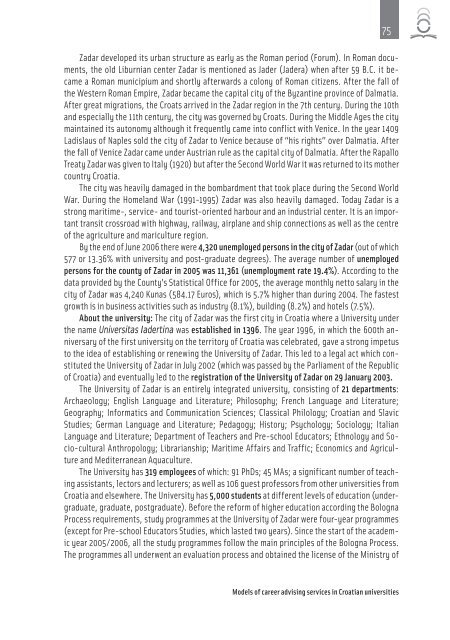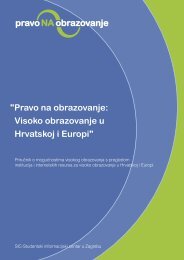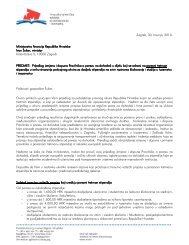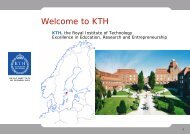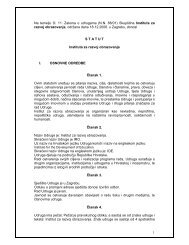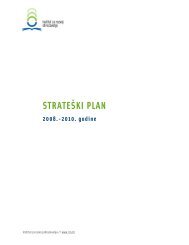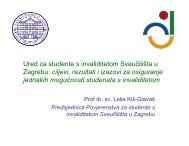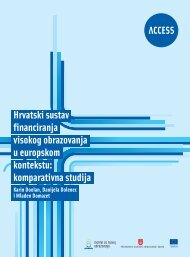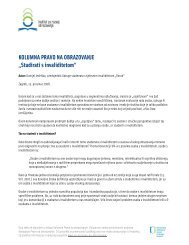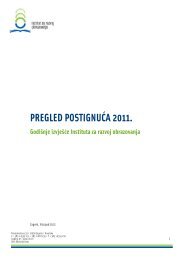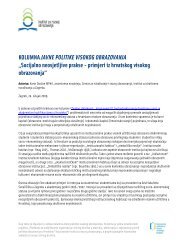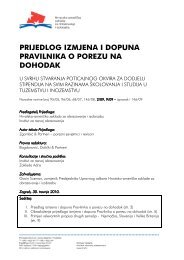Download handbook, PDF format (English) - Institut za razvoj ...
Download handbook, PDF format (English) - Institut za razvoj ...
Download handbook, PDF format (English) - Institut za razvoj ...
You also want an ePaper? Increase the reach of your titles
YUMPU automatically turns print PDFs into web optimized ePapers that Google loves.
Zadar developed its urban structure as early as the Roman period (Forum). In Roman documents,the old Liburnian center Zadar is mentioned as Jader (Jadera) when after 59 B.C. it becamea Roman municipium and shortly afterwards a colony of Roman citizens. After the fall ofthe Western Roman Empire, Zadar became the capital city of the By<strong>za</strong>ntine province of Dalmatia.After great migrations, the Croats arrived in the Zadar region in the 7th century. During the 10thand especially the 11th century, the city was governed by Croats. During the Middle Ages the citymaintained its autonomy although it frequently came into conflict with Venice. In the year 1409Ladislaus of Naples sold the city of Zadar to Venice because of “his rights” over Dalmatia. Afterthe fall of Venice Zadar came under Austrian rule as the capital city of Dalmatia. After the RapalloTreaty Zadar was given to Italy (1920) but after the Second World War it was returned to its mothercountry Croatia.The city was heavily damaged in the bombardment that took place during the Second WorldWar. During the Homeland War (1991-1995) Zadar was also heavily damaged. Today Zadar is astrong maritime-, service- and tourist-oriented harbour and an industrial center. It is an importanttransit crossroad with highway, railway, airplane and ship connections as well as the centreof the agriculture and mariculture region.By the end of June 2006 there were 4,320 unemployed persons in the city of Zadar (out of which577 or 13.36% with university and post-graduate degrees). The average number of unemployedpersons for the county of Zadar in 2005 was 11,361 (unemployment rate 19.4%). According to thedata provided by the County’s Statistical Office for 2005, the average monthly netto salary in thecity of Zadar was 4,240 Kunas (584.17 Euros), which is 5.7% higher than during 2004. The fastestgrowth is in business activities such as industry (8.1%), building (8.2%) and hotels (7.5%).About the university: The city of Zadar was the first city in Croatia where a University underthe name Universitas Iadertina was established in 1396. The year 1996, in which the 600th anniversaryof the first university on the territory of Croatia was celebrated, gave a strong impetusto the idea of establishing or renewing the University of Zadar. This led to a legal act which constitutedthe University of Zadar in July 2002 (which was passed by the Parliament of the Republicof Croatia) and eventually led to the registration of the University of Zadar on 29 January 2003.The University of Zadar is an entirely integrated university, consisting of 21 departments:Archaeology; <strong>English</strong> Language and Literature; Philosophy; French Language and Literature;Geography; In<strong>format</strong>ics and Communication Sciences; Classical Philology; Croatian and SlavicStudies; German Language and Literature; Pedagogy; History; Psychology; Sociology; ItalianLanguage and Literature; Department of Teachers and Pre-school Educators; Ethnology and Socio-culturalAnthropology; Librarianship; Maritime Affairs and Traffic; Economics and Agricultureand Mediterranean Aquaculture.The University has 319 employees of which: 91 PhDs; 45 MAs; a significant number of teachingassistants, lectors and lecturers; as well as 106 guest professors from other universities fromCroatia and elsewhere. The University has 5,000 students at different levels of education (undergraduate,graduate, postgraduate). Before the reform of higher education according the BolognaProcess requirements, study programmes at the University of Zadar were four-year programmes(except for Pre-school Educators Studies, which lasted two years). Since the start of the academicyear 2005/2006, all the study programmes follow the main principles of the Bologna Process.The programmes all underwent an evaluation process and obtained the license of the Ministry of75Models of career advising services in Croatian universities


